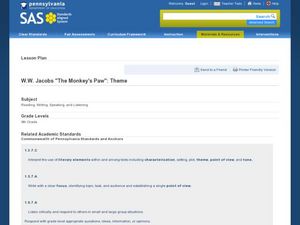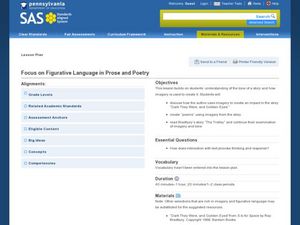National Endowment for the Humanities
Family Voices In As I Lay Dying
Learners analyze William Faulkner's 'As I Lay Dying' and his use of multiple voices. In this William Faulkner lesson plan, students analyze Faulkner's use of multiple voices in narration. Learners examine the Bundren family through the...
National Endowment for the Humanities
Faulkner's As I Lay Dying: Crossing the River
Learners analyze the multiple voices in William Faulkner's As I Lay Dying. In this multiple voices lesson plan, students explore the use of symbolism with the narrative voices of the text. Learners write a detailed profile of one...
Curated OER
Things Aren't Always What They Seem
Young scholars use video and the Internet to make predictions, draw conclusions, determine conflict and point of view while reading a short story. In this short story analysis lesson, students watch a related video and complete a...
Curated OER
Apply Post-Reading Skills and Discuss Persuasive Text
Students put their reading comprehension skills to practice. In this interpreting text lesson plan, students read "Chief Red Jacket's Reply," and then respond to questions that require them to reason, infer, and analyze the selection.
Curated OER
Focus On Figurative Language in Prose
Students examine the use of literary prose in the story, "Dark They Were, and Golden-Eyed." In this literary prose lesson, students investigate the use of imagery, metaphor, and simile in the story. They tell how author's purpose is...
Curated OER
W.W. Jacob's "The Monkey's Paw" Theme
Students identify the theme of "The Monkey's Paw" and relate it to prior knowledge. In this "The Monkey's Paw" instructional activity, students discuss fate and coincidence and debate which one controls destiny. A test is chosen as the...
Curated OER
Could You Repeat That?
Students participate in an oral story telling activity designed to show how story embellishments occur. They read "Beowulf" and identify incongruities that suggest additions and embellishments over the years.
Curated OER
Revision Activities
In this revision activities worksheet, students plot the development of tension throughout the book, answer seven questions about plot, analyze characters and theme, and discuss the writing style of the author. Students answer ten short...
Curated OER
Focus on Figurative Language in Prose and Poetry
Young scholars place emphasis on the use of figurative language when analyzing prose and poetry. In this figurative language activity, students explore the tone of a story and its imagery. Young scholars read and discuss how the author...
Curated OER
Japanese Poetry: Tanka? You're Welcome!
Students analyze Japanese tanka poetry. In this Japanese poetry lesson, students identify analyze the structure of tanka poetry. Students complete the activities at the given links for the lesson and compose two tanka poems.
Curated OER
Come On, Rain!
Students read and analyze the story. In this language arts instructional activity, students read Come on, Rain! and examine how mood and tone are created, the use of figurative language and the characteristics of the genre. Students...
Curated OER
Reading Shakespeare
Students rebuild the a portion of the text of Twelfth Night by reordering lines of text to create meaning thereby gaining confidence when in their ability to gain meaning when reading Shakespeare.
Curated OER
The Death of the Ball Turret Gunner
Students read and analyze a poem about a speaker's posthumous view of war, assess the purpose of an author's note and evaluate the effect of the point of view on the reader's response. They work in groups to discuss and analyze the poem.
Other popular searches
- Making Inferences Worksheet
- Observation and Inferences
- Making Inferences in Reading
- Reading Making Inferences
- Making Inferences Grade 2
- Making Inferences Stories
- Lesson Making Inferences
- Inferences and Context Clues
- Generalizations / Inferences
- Inferences in Reading
- Reading Inferences
- Making Inferences 3rd Grade














